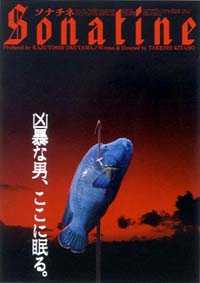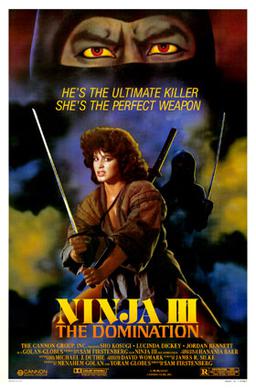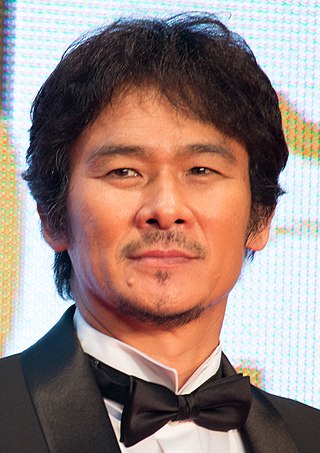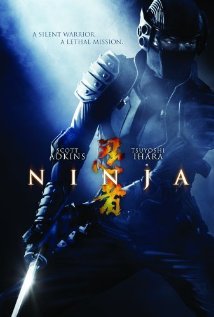Lana Wachowski and Lilly Wachowski are American film and television directors, writers and producers. The sisters are both trans women.

Ichi the Killer is a 2001 Japanese horror yakuza film directed by Takashi Miike, written by Sakichi Sato, and starring Tadanobu Asano and Nao Omori. Based on Hideo Yamamoto's manga series of the same name, its plot follows a psychologically damaged man who is manipulated into assaulting or killing rival faction members of feuding yakuza gangs while being pursued by a sadomasochistic enforcer.

Sonatine is a 1993 Japanese yakuza film directed, written and edited by Takeshi Kitano, who also stars in the film. It won numerous awards and became one of Kitano's most successful and praised films, garnering him a sizable international fan base.
James McTeigue is an Australian film and television director. He has been an assistant director on many films, including Dark City (1998), the Matrix trilogy (1999–2003) and Star Wars: Episode II – Attack of the Clones (2002), and made his directorial debut with the 2005 film V for Vendetta to critical acclaim. Since Vendetta he has collaborated with the Wachowskis an additional four times as director on The Invasion, Ninja Assassin and Sense8, and as producer of The Matrix Resurrections.

The Foot Clan is a fictional ninja clan in the Teenage Mutant Ninja Turtles comics and all related media and are the main antagonists. It is led by the devious Shredder and his second in command Karai. The Foot Clan was originally a parody of the criminal ninja clan The Hand in the Daredevil comics. In addition to the obvious similarity in their names, both clans originate from Feudal Japan, practice ninjutsu and black magic, and are now powerful global organized crime rings who are familiar with multiple illegal activities such as drug smuggling, counterfeiting of money, gunrunning, murder, assassination, computer hacking, theft, and terrorism.

Sho Kosugi is a Japanese actor, martial artist and writer with extensive training in Shindō jinen-ryū Karate, Kendo, Judo, Iaido, Kobudo, Aikido and Ninjutsu. A former All Japan Karate Champion, he gained popularity as an actor during the 1980s, often playing ninjas. He starred in a trilogy of martial arts ninja films produced by Cannon Films, before starring in the primetime television series The Master. His work helped establish ninjas in popular culture, leading to a "ninja boom" or "ninjamania" during the early-to-mid-1980s.

Kōju Meguro, better known by his stage name Hiroki Matsukata, was a Japanese actor. He was the son of jidaigeki actor Jūshirō Konoe and actress Yaeko Mizukawa and has a younger brother, Yūki Meguro, who is also an actor. With ex-wife actress Akiko Nishina he had two children; son Masaki Nishina and daughter Hitomi Nishina are both in the entertainment industry.

Revenge of the Ninja is a 1983 American martial arts–thriller film directed by Sam Firstenberg, and starring martial artist Sho Kosugi, Keith Vitali, Virgil Frye and Kane Kosugi. The plot follows a ninja trying to protect his only son from a cabal of ruthless gangsters.

Ninja III: The Domination is a 1984 American martial arts action horror film directed by Sam Firstenberg, and starring Sho Kosugi, Lucinda Dickey, Jordan Bennett, and James Hong. It is the third film in Cannon Films' Ninja Trilogy anthology series, the first being Enter the Ninja, and the second being Revenge of the Ninja. Like the previous films in the series, it has also garnered a cult following.

Enter the Ninja is a 1981 American martial arts film directed by Menahem Golan and starring Franco Nero, Susan George, Sho Kosugi and Christopher George. The film is about a martial artist named Cole (Nero) who is visiting his friend Frank in the Philippines. On arrival, Cole learns that his friend is being harassed by the wealthy businessman Charles Venarius who wants Frank's land for the oil underneath. Frank and his wife are continuously thwarted by Cole who defends them with his martial arts skills. Learning of Cole's presence, Venarius hires his own ninja (Kosugi).

War is a 2007 American action thriller film directed by Philip G. Atwell in his directorial debut and featuring stage combat choreographed by Corey Yuen. The film stars Jet Li and Jason Statham, and was released in the United States on August 24, 2007. War features the second collaboration between Jet Li and Jason Statham, reuniting them for the first time since 2001 film The One. Jason Statham plays an FBI agent determined to take down a mysterious assassin known as Rogue, after his partner is murdered.

Black Eagle is a 1988 American action film directed by Eric Karson and starring Shō Kosugi, Jean-Claude Van Damme, and Kane Kosugi. It was shot on the Mediterranean island of Malta. The film was released in the United States on May 19, 1988.
Kane Takeshi Kosugi is an American actor and martial artist of Japanese and Chinese descent.

Fudoh: The New Generation is a 1996 Japanese movie directed by Takashi Miike. It is based on an unfinished manga series by Hitoshi Tanimura. Two sequels followed, neither of which were directed by Miike.

Tsuyoshi Ihara is a Japanese actor, martial artist, and writer of Korean descent.

The Machine Girl is a 2008 Japanese horror action comedy film written and directed by Noboru Iguchi, and starring Minase Yashiro, Asami, Kentarō Shimazu and Honoka. The plot follows an orphaned Japanese schoolgirl whose life is destroyed when her brother is killed by a son of a Ninja-Yakuza clan. When her hand is cut off, she replaces it with a makeshift machine gun and seeks revenge.

Pray for Death is a 1985 American martial arts action film directed by Gordon Hessler and starring Sho Kosugi, James Booth, Norman Burton, Michael Constantine, and, the lead's sons Kane and Shane Kosugi.

Ninja is a 2009 American martial arts film directed by Isaac Florentine and starring Scott Adkins, Tsuyoshi Ihara and Mika Hijii. The film's plot revolves around an American martial artist named Casey Bowman, who is asked by his sensei to travel to New York City and protect the Yoroi Bitsu, an armored chest that contains the weapons of the last Kōga ninja.
Sword for Truth is a 1990 OVA chanbara film directed by an uncredited Osamu Dezaki, who was credited as storyboard artist under the alias "Tsutomu Dezaki". The film is based on a series of novels by Takeshi Narumi.

Altered Carbon: Resleeved is a 2020 Japanese animated film that is a spin-off of Netflix's Altered Carbon television series. The film is directed by Jō Nakajima and written by Dai Satō and Tsukasa Kondo. Set 253 years before the main events of season 1, and 283 years before the events of season 2, Takeshi Kovacs, on the planet Latimer, must protect a tattooist while investigating the death of a yakuza boss alongside a no-nonsense CTAC.
















